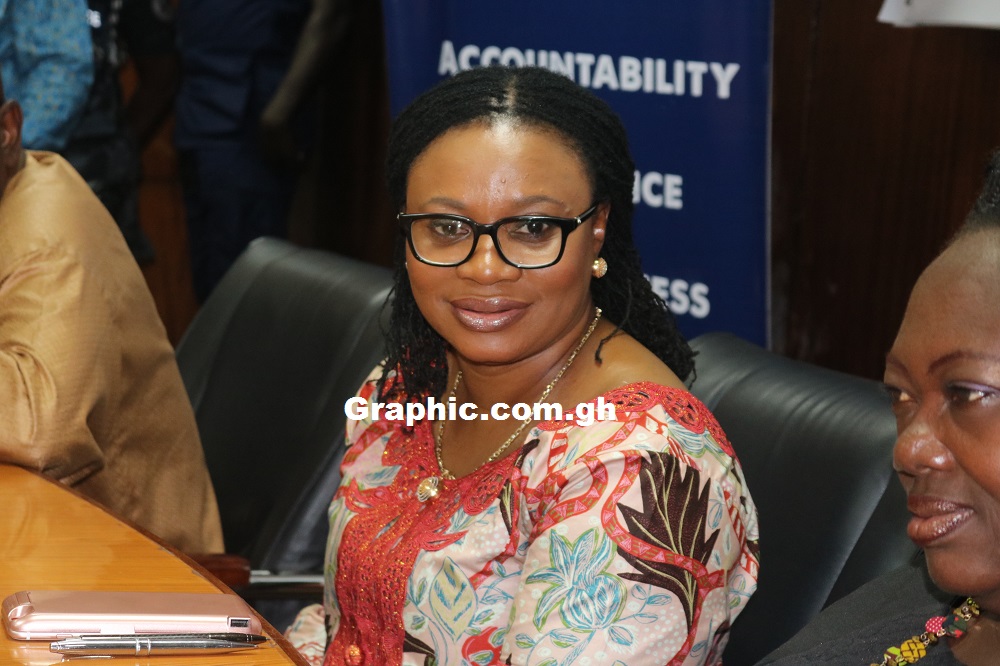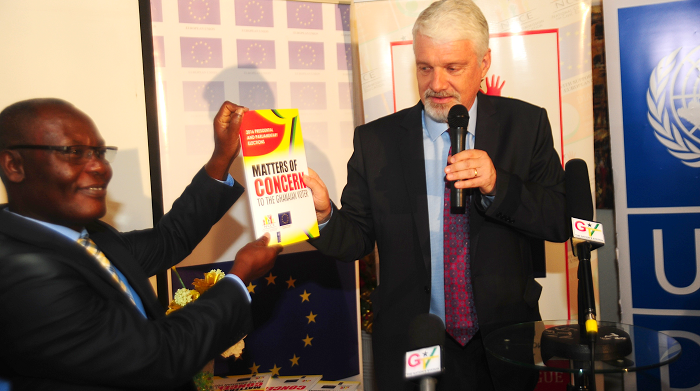
EC gets over 60% confidence rating
More than half of respondents in a study conducted by the National Commission for Civic Education (NCCE) have expressed confidence and trust in the Electoral Commission (EC) to conduct free, fair and credible elections in December.
Advertisement
A report of the study released by the NCCE in Accra yesterday said 4,946 out of 7,435 respondents, representing 66.5 per cent, interviewed said the EC had a good reputation, a good track record and competent staff and was a constitutionally mandated body to conduct elections and declare results.
They, however, suggested some changes with regard to the electoral system, including a new voters register, free and fair conduct of elections and improvement in the biometric voting technology/E voting and counting/simplify EC form.
According to the report, education, health and employment were ranked in that order as issues of concern to voters, out of the 16 areas selected for the survey.
On the growth and maintenance of democracy in Ghana, the respondents acknowledged that one of the main threats to democratic stability in the country was election violence but were convinced that violence could be minimised through civic education.
They were of the view that citizens needed to defend the 1992 Constitution against all forms of abuse and violation to safeguard the country’s democracy.
On how the country was growing its democracy, the respondents said Ghana was doing well in terms of respect for human dignity and freedom of speech but said they were not satisfied with the level of commitment to civic responsibilities, the rule of law and improvement in living conditions in the country.
Important issues
Presenting an overview of the report, the Secretary and Head of the Research, Gender and Equality Department of the NCCE, Mr Tito Voegborlo, stated that the study interviewed 7,435 respondents, out of whom 3,991 (53.7 per cent) were males, while 3,444 (46.3 per cent) were females.
The study established that a sizable number of Ghanaians were ready to vote for a woman as President of the country.
Also sampled were 268 respondents who were persons with disabilities, he said.

Launching
Launching the report, the Ambassador and Head of the European Union (EU) Delegation to Ghana, Mr William Hanna, said the EU’s support for the research was based on its belief in civic education, actions empowering citizens to exercise and defend their democratic rights and responsibilities in society.
He said the EU also valued diversity and desired to encourage all citizens to play an active part in a society under transformation and added that the active participation of citizens in the political debate during campaigning periods that were free and issue-based could lead to the credibility of an election process.
Review of report
A senior lecturer at the University of Ghana Business School, Mr Justice Nyigmah Bawole, in his review, said the report of the research would feed into political activities because most political parties were not well resourced to do research on their own and that it would also help the development partners in planning funding for the NCCE.
He was, however, not sure whether the findings would influence voters and called on the NCCE to do a quick survey immediately after the elections because, according to him, people could easily be swayed by politicians, as people in some regions voted en bloc.
For his part, a senior fellow at the Institute of African Studies of the University of Ghana, Dr Kojo Opoku Aidoo, said the study did not cover much on pension and the administration of justice, since it was silent on pension and prisoners.
He was of the view that some of the promises made by politicians were not pragmatic but populist and unattainable.
Meanwhile, a Deputy Chairman (Operations) of the NCCE, Mr Samuel Asare Akuamoah, criticised political parties for their cold attitude and negative response to programmes of the commission.
Responding to a question during the launch of the research report on “Matters of Concern to the Ghanaian Voter”, he said the problem the NCCE had with the political parties, especially the major ones, was that the parties had not been responding to the overtures and requests of the commission.
Mr Akuamoah, therefore, urged the political parties to liaise closely with and show a keen interest in the activities and programmes of the NCCE as it discharged its constitutional mandate.
During an open forum, participants expressed concern over the huge number of rejected ballots and how to curb the incidence and the lack of resources for the NCCE to effectively prosecute its mandate.
It also came out that delays in the appointment of heads for some institutions, such as NCCE and the Commission on Human Rights and Administrative Justice (CHRAJ) affected their effective functions and operations.
The participants said, for example, that while the NCCE had been without a substantive head for about a year, the CHRAJ also lacked same for the past two years.
They called for adequate resources for those institutions to discharge their constitutional mandates.
Earlier, the Country Director of the United Nations Development Programme, Mr Dominic Sam, had said the programme would continue to support the NCCE in the discharge of its duties.



